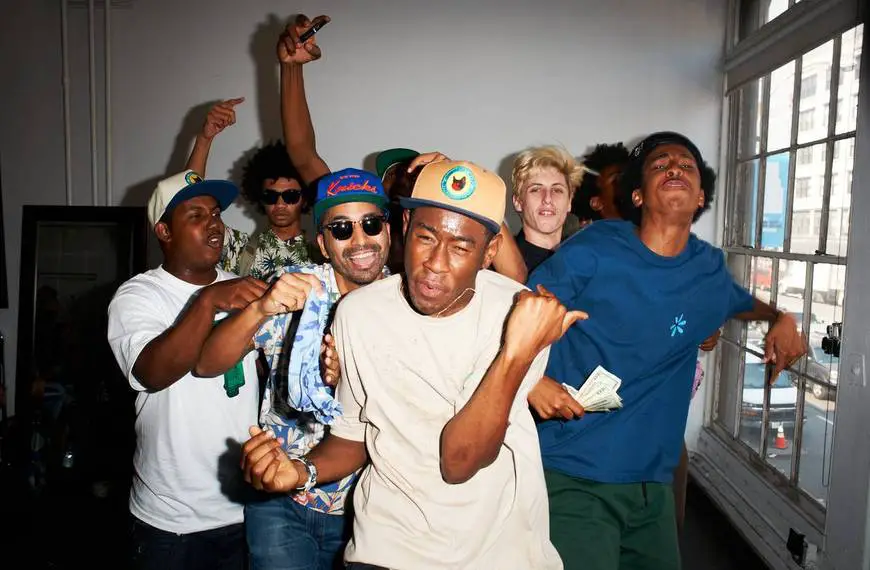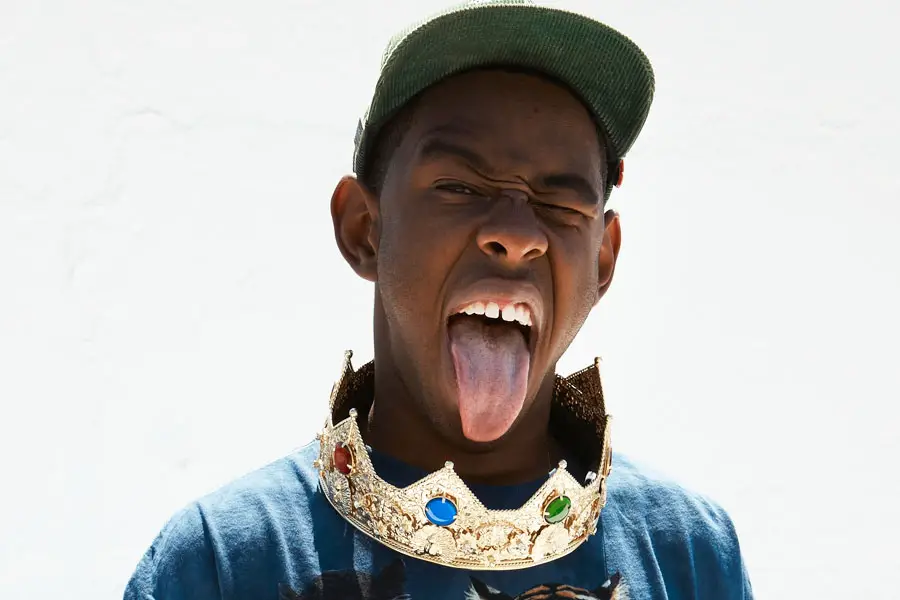From being the most recognizable member of the hip-hop collective Odd Future, to achieving commercial success through his controversial, yet extremely creative music, Tyler, The Creator has left his stamp on both hip-hop and American pop-culture. Tyler is so controversial that he has repeatedly been banned from entering foreign countries, as they believe he poses a threat to public order. While Tyler has said and done some ridiculously offensive things, it is important to separate the artist from the art, and try to understand why he has gained such a following.
With this year’s release of “Cherry Bomb The Documentary,” listeners and fans alike were given the opportunity to witness Tyler’s creative process, and gain further insight into the unapologetically anti-social creator (pun intended) of the 2015 album, “Cherry Bomb.” He has become a household name without suppressing his vulgarity, and continues to make art, clothes and music that HE enjoys; he trusts himself enough to not care what other people think about his work.
One of Tyler’s closest friends, Sydney “Syd” Bennett (the lead singer of The Internet) spoke about Tyler’s confidence in his own ideas in “Cherry Bomb The Documentary.” She said, “The biggest thing I’ve learned from Tyler is to trust your ideas. I don’t agree with all of his ideas, but when somebody trusts themselves that much, it makes you question yourself if you don’t like it.” This confidence in himself has manifested itself in a multitude of ways, including the influence that it has had on other members of Odd Future. Two other members of the group have gone on to achieve massive success in their own right, and have done so in very different ways.
Earl Sweatshirt, similarly to Tyler, garnered a cult-following for his involvement with Odd Future. He has remained relevant, however, for completely rejecting a mainstream sound. Instead, Earl has stuck to what gained him popularity in the first place: dark, gritty and, most importantly, complex lyrics that separate him from other artists. It is this attachment to his own sound, and the refusal to appeal to a more casual audience, that has shown Tyler’s influence on Earl.

The other member of Odd Future, the one who has surpassed even Tyler in terms of popularity, is Frank Ocean. Frank and Tyler’s relationship is touched upon in “Cherry Bomb The Documentary,” and the influence that they have on one another is not as visible as Tyler and Earl’s. After the success of Frank’s debut record, “channel ORANGE,” fans were left begging for more from the R&B star. The impatience from fans became more and more hostile as the time between albums went on. It was clear that Frank trusted himself enough to know that people would love what he produced, and wanted to make sure that he was proud of what he would make available to the public, instead of rushing an album out to capitalize on the hype.
There is no doubt that Tyler was involved in the process of creating Frank’s newest album “Blonde,” and was not shy about how proud he was of Frank. Tyler told “GQ Style” that, “I low-key think (Frank) started getting annoyed cause I just kept badgering him about how much I liked the album. But I really, really fucking like it.” Tyler’s influence goes beyond Odd Future, as well. Kanye West and Lil’ Wayne are featured in “Cherry Bomb The Documentary,” and they reveal more about Tyler’s creative process and influence on them.
“He’s one of those guys who knows exactly what he wants from you. He might fuck around and write your verse for you,” Wayne said about working with Tyler. “Tyler changed the game because maybe I had a line that I wouldn’t say because people might think it’s too gross to put in a rap, and I would think ‘Man, Tyler would say this shit.’ People are not listening to him, they are only hearing him, and they need to listen.” Included in “Cherry Bomb The Documentary,” is a conversation between Kanye West and Tyler. “I’m glad you put that battery in my back,” West said to Tyler. “That’s one of your jobs in hip-hop. I don’t think there would have been a ‘Yeezus’ if it wasn’t for you.”
Wayne and West are both featured on the track titled “Smuckers” on Tyler’s album “Cherry Bomb.” Their respective verses are recognized as some of the best work either artist has put out in years, and it is clear from both of their opinions of Tyler that he was able to draw that inspiration out of them. “I don’t think there would have been this verse [referring to ‘”Smuckers”] if it wasn’t for you,” West said talking about how Tyler inspired him. “Or the shit that Wayne just did.”
Another aspect of Tyler’s personality that is highlighted in the documentary is his absolute obsession, and immense knowledge, of other genres of music. His work with Charlie Wilson really highlights how much he appreciates those that came before him, and makes it more difficult to write Tyler off as an ignorant kid who doesn’t have any respect. His love and knowledge of music is further displayed in his interviews. One that stands out is his interview with Nardwuar the Human Serviette, in which Tyler is able to recall specific tracks, release dates and producers from albums that were released in the 1970s.
It is very simple to take Tyler’s lyrics at face-value and believe that he is a complete maniac who advocates rape and murder. However, if one took the time to understand the reasoning behind the insanity of his lyrics, they might find that they had missed the point entirely. Luis Panch Perez, the director of photography for Tyler’s “Buffalo” music video, had this to say about Tyler: “The problem is America isn’t ready to have the intelligent conversation. They read a headline, but that’s actually the problem. Half of me goes, ‘Fuck, this ain’t my thing,’ but if this dude is going to push a button to start an important dialogue then fuckin’ A, dude.”
Agreeing with the message that Tyler is sending in his music is a completely different problem, and it is ridiculous to assume that everyone should appreciate what he does. It is important, however, to understand Tyler’s role in the world of music and pop culture. To dismiss him as dangerous is only an excuse to avoid talking about the subject matter of his music. Whether or not one wants to hear about it, the things that Tyler talks about happen in the real world. It is not his fault that everyone else is willing to ignore it.

















